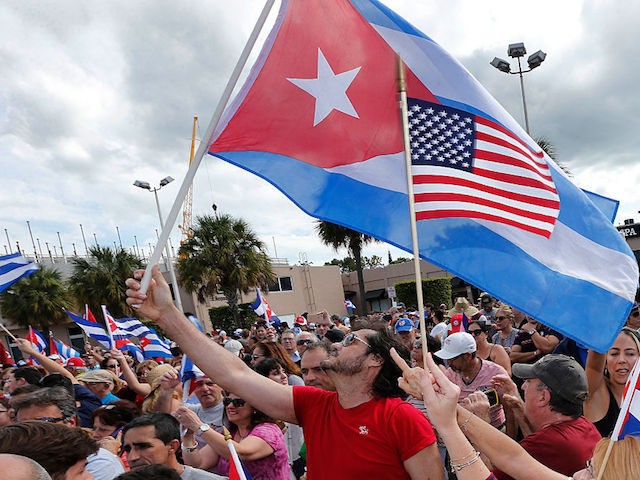A remarkable story is taking place in Florida and the mainstream media has missed it. It deals with the political recovery of the Cuban-American community in its decades-long struggle to free Cuba from a brutal Communist dictatorship.
Barely three years ago, it seemed that the Cuban Communist regime had finally outflanked freedom forces within Cuba and in the Cuban-American enclaves in the United States.
On December 2014, Raúl Castro and Barack Obama announced the normalization of diplomatic relations between the United States and Cuba’s Communist Regime.
The Obama Administration initiated a unilateral process of political and economic concessions. Serious efforts were made by the administration and Congress to repeal the Cuban Liberty Act, which places democracy and human rights at the top of U.S. relations towards the island. Sadly, even some prominent businessmen in Miami’s Cuban-American community had endorsed these questionable efforts.
Media outlets in the U.S. had bought into the narrative of a supposedly reformist Raúl Castro as a legitimate ruler who was willing to hand over power and unveil a new constitution. The regime’s multiple crimes against humanity and its persistent repression were cast aside as inconvenient. It appeared as if the Cuban resistance had finally been defeated.
Today, the Cuban Communist regime, now bereft of its Pharaonic founder and maximum leader, is beset by economic sanctions that have affected its main sources of income and by growing internal unrest, which shows no sign of abating. Cruise tourism from the U.S. to the island has ended, and many whose properties were unlawfully confiscated by the regime are now able to sue third-party exploiters of these properties in U.S. courts.
Raúl Castro and his brood have been designated as gross violators of human rights and sanctioned by the U.S. government as legislatures in at least three Latin American countries are today considering the unprecedented possibility of prosecuting the Castro regime for its crimes against humanity. This initiative has also been supported by the Organization of American States (OAS) and the Centrist International, one of the largest networks of political parties in the world.
What happened then?
The Castro regime continued to be what it is, and the free Cubans did not give up.
In December 2014, the official policy of the United States towards the island was replaced by a confusing and ambiguous economic agenda that relegated the issues of human rights and democracy. The regime never had any interest in taking a substantial step towards the United States. Instead, Cuba’s totalitarian regime targeted and injured U.S. diplomats with what appear to be microwave weapons, deepened and consolidated its control over Venezuela, and intensified its internal repression.
Rather than seeing in the U.S. opening a possibility of substantial internal and external transformations of its systems, opening up the island politically and economically to its own citizens, the Castro regime heightened and prolonged political and cultural controls. It found in the U.S. opening an opportunity to prolong its monolithic control of power and not the moment to begin national reconciliation and democratic reconstruction.
Aware of the nature of the beast, the Cuban-American community came together in a broad coalition that, from the U.S. Congress to the streets of Miami, mobilized citizens, legislators, and local, national, and international political leaders.
Capable Cuban-American legislators prevented the Cuban Liberty Act from being repealed by Congress. The Assembly of the Cuban Resistance, a broad coalition of Cuban American freedom organizations within Cuba and in the United States, persistently mobilized the community.
Through petitions, protests, and rallies, the community came together in advocacy of significant sanctions against the Castro dictatorship. In what observers thought was a movement against all odds, committed activists focused on ending cruise tourism to the island and in favor of full implementation of Title III of the Cuban Liberty Act, which permits rightful owners of confiscated properties in the island to sue third party exploiters in U.S. courts. Continued courageous resistance inside Cuba and the plight of political prisoners inspired these efforts.
The continuous and diverse public events demonstrated sufficient numbers and intensity that showed that the key Cuban-American core vote was opposed to Obama’s policy towards Cuba.
The civic organizations, which make up the core of the community, supported the Bay of Pigs Veteran’s Association in its endorsement of Donald Trump as the candidate with the most coherent policy proposal towards Cuba. The massive vote of the Cuban diaspora for Trump, which was key for his victory in Florida, was in many ways primarily a plebiscite on Obama’s policy towards Cuba.
Blinded by ideology, made to order boutique polls and mainstream media spin, most presidential campaigns missed the point in 2016: The cause of Cuba’s freedom will not disappear until it is achieved.
It is an intergenerational struggle that has continued unabated for 60 years. The rejection of the Castro regime is deep and resolute for a majority of the Cuban population inside and outside the island.
Above all, it is a serious political error to underestimate the level of conviction of the Cuban diaspora. It constitutes an intergenerational commitment imbricated with the community’s very identity. It will neither wither nor dilute while the repressive conditions that caused the separation of thousands of Cuban families from their homeland remain.
Dr. Orlando Gutierrez-Boronat is a writer, educator, and co-founder and spokesman for the Cuban Democratic Directorate (Directorio).

COMMENTS
Please let us know if you're having issues with commenting.